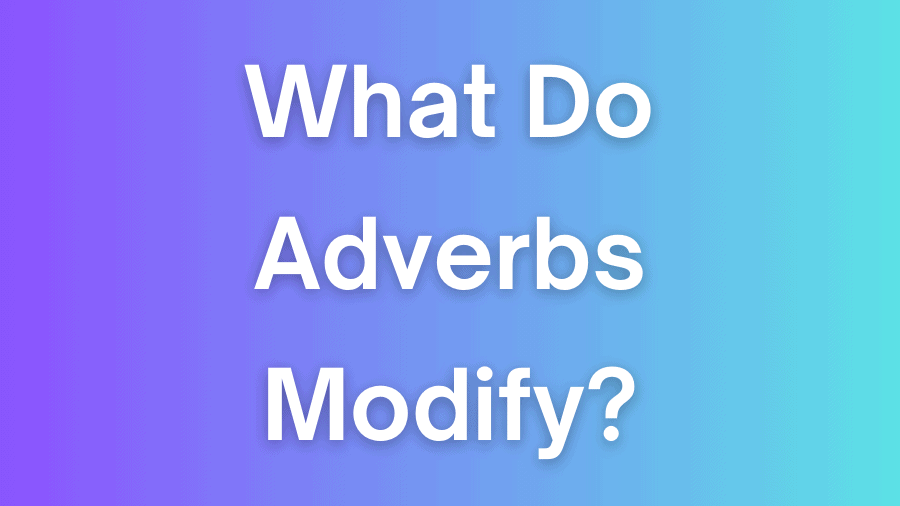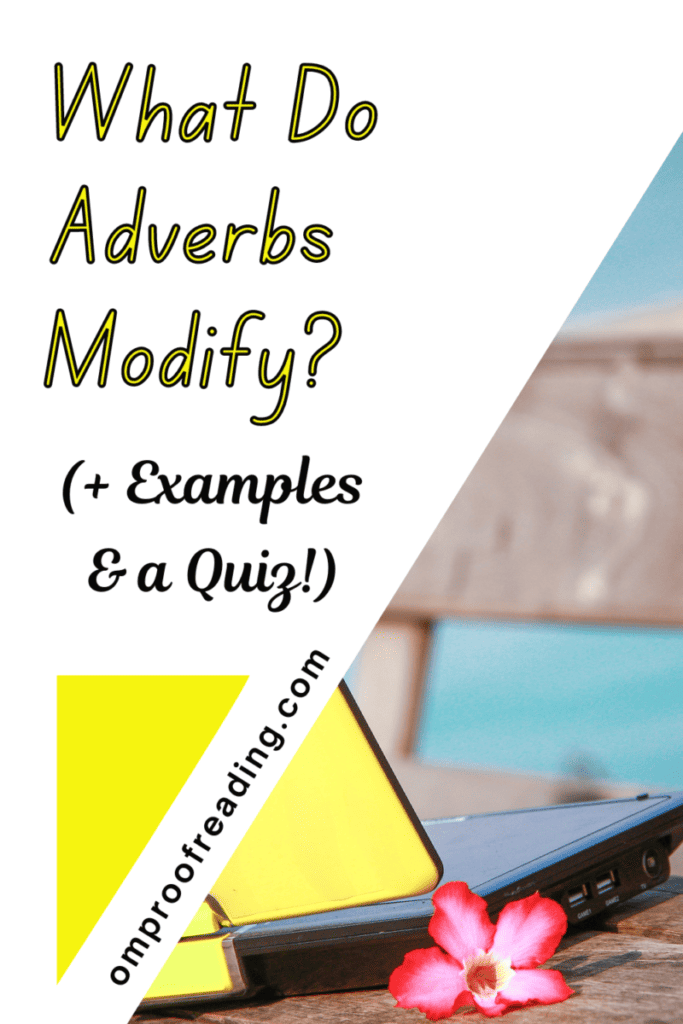This article may contain affiliate links. Please see our affiliate disclaimer in the footer menu for more information. Thank you for your support!

You may know that adverbs are a relatively versatile part of speech, but what do adverbs modify? As a trained proofreader who has spent time getting acquainted with adverbs, I can help you answer this question.
Adverbs can modify (describe) three parts of speech: verbs, adjectives, and other adverbs. Adverbs can even modify entire sentences. Adverbs that modify sentences are known as sentence adverbs.
Let’s see examples of what adverbs modify so we can understand how to correctly incorporate them into our writing and detect when they’ve been misused.
What Are Adverbs?
Adverbs are one of eight parts of speech in the English language.
Let’s see how The Chicago Manual of Style (CMOS)—the go-to style guide in the publishing industry—defines the word adverb.
“An adverb is a word (more particularly, an adjunct) that qualifies, limits, describes, or modifies a verb, an adjective, or another adverb.”
– CMOS
Adverbs are versatile words that can add detail and nuance to our writing, making it more clear and compelling.
Adverbs give a distinct flavor to our phrases.
However, overusing adverbs can have the opposite effect of what we intend—leading to humdrum and stuffy writing.
For example, let’s compare these two sentences:
1) The turtle moved very slowly.
This sentence contains two adverbs: very and slowly.
Ho hum, this sentence makes me numb. 😉
2) The turtle moved stealthily.
This sentence has one adverb: stealthily.
I have a hunch this sentence packs a punch! 😊
Which sentence paints a more vivid image in your mind?
Nonetheless, adverbs have their place. Sometimes it’s difficult to say what we mean without reaching for an adverb.
I authored an article about how to find adverbs in sentences if you’d like to become better acquainted with this part of speech.
What Do Adverbs Modify?
Let’s review the parts of speech adverbs modify.
What Parts of Speech Can Adverbs Modify?
| Part of Speech | Can an Adverb Modify It? |
|---|---|
| noun | X |
| pronoun | X |
| verb | ✔ |
| adjective | ✔ |
| adverb | ✔ |
| preposition* | X |
| conjunction* | X |
| interjection | X |
Adverbs modify prepositions and conjunctions so infrequently that those instances won’t be included in this article. For the purpose of this post, we’ll stick to the common notion that adverbs modify verbs, adjectives, and adverbs.
It’s important to note that adverbs can also modify entire sentences.
Before we see examples of adverbs in action, we need to know the questions adverbs answer when they modify words.
Here are the questions to keep in mind:
- How?
- When?
- Where?
- To what extent? (How often? or How much?)
Now let’s deepen our understanding of adverbs by seeing how they modify verbs, adjectives, adverbs, and sentences.
Adverbs Modify Verbs

Adverbs most commonly modify verbs.
When modifying verbs, adverbs can answer any of the four questions we just looked at.
Let’s see a couple of example sentences.
1) Example: The coati carefully searched the forest floor.
The verb in this sentence is searched.
The adverb carefully tells us how the coati searched.
- How did the coati search? (carefully)
2) Example: It rarely rains in Costa Rica during the dry season.
The verb in this sentence is rains.
The adverb rarely tells us to what extent (how often) it rains in Costa Rica during the dry season.
- How often does it rain during the dry season? (rarely)
Now let’s explore how adverbs modify adjectives.
Adverbs Modify Adjectives

Adverbs can also modify adjectives.
When modifying adjectives, adverbs typically answer one of two questions:
- How?
- To what extent? (How often? or How much?)
Furthermore, adverbs always come before the adjectives they modify.
Let’s examine the examples!
1) Example: The clouds seem especially fluffy.
The adjective in this sentence is fluffy.
Fluffy modifies (describes) the noun clouds (clouds = fluffy)
Explanation: The adverb especially tells us how fluffy the clouds seem.
- How fluffy do the clouds seem? (especially)
2) Example: Sheila was reasonably certain of her answer.
The adjective in this sentence is certain.
Certain modifies the noun Sheila. (Sheila = certain)
Explanation: The adverb reasonably lets us know how certain Sheila was.
- How certain was Sheila? (reasonably)
Let’s mosey on over to adverbs modifying adverbs.
Adverbs Modify Adverbs

When adverbs modify other adverbs, they come before the word they describe.
1) Example: The puppy slept remarkably well in its new home.
The adverb remarkably modifies the adverb well.
Explanation: Remarkably tells us how well the puppy slept.
- How well did the puppy sleep? (remarkably)
2) Example: The hillside was almost entirely blanketed with wildflowers.
The adverb almost modifies the adverb entirely.
Explanation: Almost tells us to what extent the hillside was entirely blanketed.
- To what extent was the hillside entirely blanketed? (almost)
Finally, we’ll discover how adverbs have the power to modify entire sentences.
Adverbs Modify Sentences

Sentence adverbs do what they sound like they do—they modify whole sentences.
They typically come at the beginning of a sentence, but we sometimes see them at the end or in the middle of a sentence.
1) Example: Apparently, it was a great day to bump into butterflies.
2) Example: Clearly, she had made up her mind.
Frequently Asked Questions
What does an adjective modify?
An adjective modifies nouns and pronouns. A noun is a person, place, thing, or idea. And pronouns are used in place of nouns to avoid using nouns repetitively. Unlike adverbs that can modify other adverbs, adjectives cannot modify other adjectives.
Can an adverb modify a noun?
Adverbs can’t modify nouns; however, they can modify noun phrases. Noun phrases contain a noun and other words that modify the noun. Put simply, a noun phrase is a collection of words that acts like a noun.
What questions do adverbs answer?
Adverbs answer the questions how, when, where, and to what extent (how often or how much) about the parts of speech they modify. I penned a post about what questions adverbs answer (with examples and a quiz) if you’d like more guidance on this topic.
Quiz: What Adverbs Modify
Now that you know what adverbs modify, here’s a quiz to check your comprehension.
I’ll give you feedback for questions you answer incorrectly.
Ready to rock the quiz? Let’s go! 😊
Important: After finishing the quiz, you’ll need to scroll back up the page to click the “View score” button.
I hope you’ve learned everything you wanted to know about what adverbs modify.
Best wishes to you!
“I believe in the hands that work, in the brains that think, and in the hearts that love . . . I believe in sunshine, fresh air, friendship, calm sleep, beautiful thoughts.”
– Elbert Hubbard

Recent Posts
Punctuation is important because it enables us to communicate our message clearly and effectively. Without punctuation, we wouldn’t understand how units of a sentence relate to one another or how...
Although you're probably somewhat familiar with adverbs, you may be unaware of sentence adverbs. As a trained proofreader who has studied the parts of speech, I can help you understand this unique...
